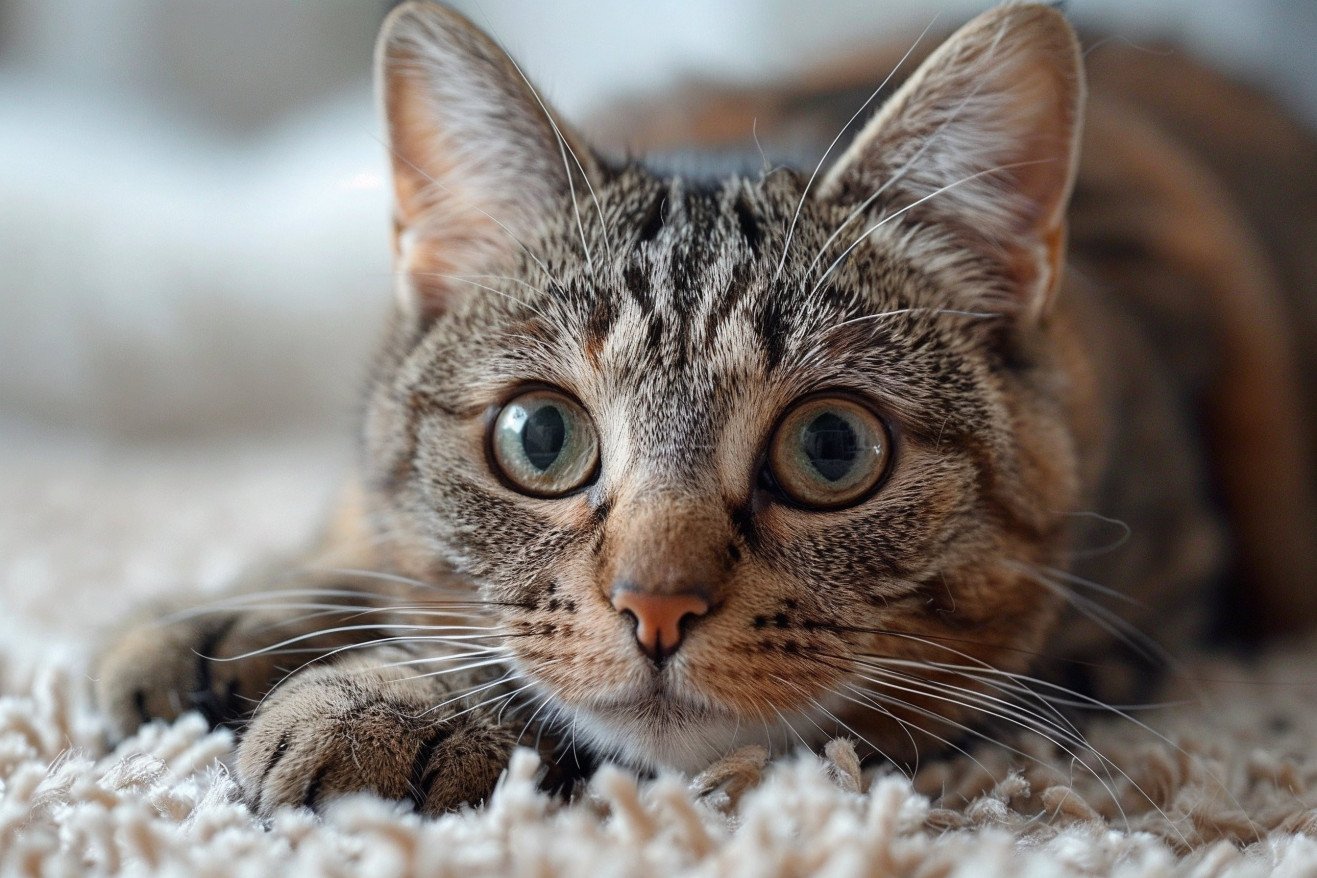How to Get Your Cat to Stop Peeing on the Carpet: Solutions That Work
27 March 2024 • Updated 27 March 2024

If you have a cat that's peeing on your carpet, you're not alone. It's a common problem that can be frustrating to deal with, but with the right knowledge and solutions, you may be able to stop your cat's inappropriate elimination. This can include addressing medical issues, making sure you have enough litter boxes, and using deterrents like enzymatic cleaners and aluminum foil, as well as environmental enrichment.
Drawing on insights from veterinarians and cat behaviorists, we'll cover a wide variety of methods to help you stop your cat from peeing on the carpet. By looking at the causes, environmental factors, and practical training solutions, you'll be able to fully understand how to solve this problem and get back to living in peace with your cat.
How can I get my cat to stop peeing on the carpet?
Medical Explanations: Why You Should See a Vet
Urinary tract infections, kidney disease, diabetes, and other medical conditions can all lead to inappropriate urination, according to Catster's team of veterinary experts. That's why a visit to the vet is so important. It's the only way to rule out any medical issues that could be contributing to the problem. In fact, some diagnostic tests, like urinalysis and bloodwork, may be needed to get to the bottom of the issue, according to PetMD.
Dr. Stephanie Globerman of The Feline Hospital explains that many cats will need to be treated for medical issues before their inappropriate urination can be resolved. If these medical issues aren't addressed, the cat may continue to have accidents and could even develop additional health problems. In fact, many common causes of inappropriate urination, like urinary tract issues, polyuria, arthritis, and other geriatric issues, will need to be ruled out before behavioral solutions can be pursued.
By seeing a vet and potentially undergoing diagnostic tests, cat owners can ensure that any medical issues that are causing their cat's litter box aversion are diagnosed and treated. This is often the only way to stop the behavior and get the cat back to using the litter box as they should.
Litter Box Management: Creating a Welcoming Environment
As Catsan Cat Litter points out, keeping the litter box clean and ensuring that it's easy to get to and use are important ways to prevent accidents. Make sure that the box is big enough for your cat and that it's in a quiet, out-of-the-way location. Companion Protect also notes that you should scoop the box daily and change the litter completely on a regular basis to keep it clean.
Catsan Cat Litter also recommends trying different types and depths of litter to see what your cat prefers. Companion Protect says that you may need to add more boxes for multi-cat households or if you have a cat with special needs, like arthritis. Make sure that you create an environment that's conducive to using the litter box, and you can help prevent accidents and encourage your cat to use the right spot.
Deterrents and Environmental Modifications: How to Stop Unwanted Behavior
Deterrents can be used to keep cats from peeing in certain areas of the house, according to Catster. Some common deterrents include aluminum foil, citrus smells like lemon and orange, and commercial cat repellent sprays. As noted by Blue Cross, blocking off access to certain areas or covering areas with plastic can also help deter cats from peeing.
Vertical scratching posts and perches can help meet your cat's need to mark their territory, according to Catster. In addition, removing environmental stressors like loud noises or changes in the home can help reduce anxiety and the resulting accidents, according to Blue Cross.
A combination of deterrents and environmental modifications can help pet parents discourage inappropriate urination and avoid future accidents. However, it's also important to make sure that the area is thoroughly cleaned and that the smell is removed to keep cats from returning to the same spot.
Cleaning and Odor Removal: Getting Rid of Lingering Smells
Getting rid of the smell of cat urine is essential to keep cats from coming back to the same place, according to The Washington Post. Enzymatic cleaners are the best at breaking down urine and removing odors from carpets and upholstery. When dealing with a fresh accident, it's important to soak up as much of the urine as possible before applying the cleaner, according to HomeMade Simple.
If you're dealing with an older stain, a UV blacklight can help you find the affected areas that need to be cleaned, according to The Washington Post. In some cases, you may need to hire a professional carpet cleaning service to deal with particularly stubborn smells or heavily soiled areas. According to The Spruce Pets, Bubba's Rowdy Friends Pet Stain & Odor Terminator and Nature's Miracle Just for Cats Stain and Odor Remover are both enzymatic cleaners that can break down cat urine stains and odors.
Getting rid of the smell of cat urine will help prevent cats from returning to the same areas. However, in addition to this, retraining and behavior modification may be necessary to get cats back to using the litter box.
Retraining and Behavior Modification: How to Get Your Cat to Use the Litter Box Again
Retraining and behavior modification can help cats relearn how to use the litter box, says Dr. Stephanie Globerman of The Feline Hospital. Keeping the cat in a small space with the litter box can help reestablish the behavior, according to Purr Partners.
Allowing the cat to have more freedom in the house while still keeping them confined at night can help make the training more permanent, says Purr Partners. Meanwhile, using calming pheromones and anti-anxiety drugs can help lower stress and make it easier for the cat to relearn the behavior, says Dr. Stephanie Globerman.
As noted by Catster, when retraining an adult cat, it’s important to use positive reinforcement and to be patient and consistent. However, when the right methods are used and the underlying issues are addressed, pet parents can help their cats relearn how to use the litter box and prevent future accidents.
Conclusion: Bringing Peace Back to Your Home and Preventing Future Incidents
Dealing with a cat that is urinating outside the litter box is not a one-size-fits-all situation. However, a combination of ruling out medical issues, making the litter box more appealing, and using deterrents can help. Making sure that the area is thoroughly cleaned and that the scent is removed is also important.
In some cases, retraining and behavior modification may be necessary. However, with time, patience, and a lot of work, cat owners can bring peace back to their home and prevent future incidents.


